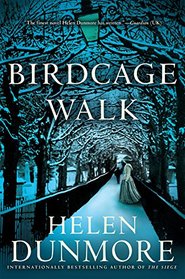Was intrigued and excited to read this book after reading the back of the book. It had it all to start with, good idea, historical fiction, nice cover and a strong women.
It started off good but didn't seem to really go anywhere quickly. It was slow paced, slow to develop and at times over worded. She couldn't seem to help talking consistently about her mother. It was a bit tedious after a while.
It started off good but didn't seem to really go anywhere quickly. It was slow paced, slow to develop and at times over worded. She couldn't seem to help talking consistently about her mother. It was a bit tedious after a while.
Out of the unpromising material of a headstone inscription and a few lines from a scrap of a letter, Helen Dunmore has created a beautifully written and constructed novel that tells the story of the most dramatic and heartbreaking months of a young woman's life. While the "great events" of the early days of the French Revolution unfold three hundred miles away, Lizzie Fawkes endures loss and makes discoveries that could destroy her. This novel is a fascinating reminder that each and every life is a drama: every one of us has a story to tell, that the "great" personalities and events of history have no monopoly on drama, terror and grief.
Like Hilary Mantel's "Wolf Hall," Dunmore's sense of period and tone is impeccable: she hits exactly the right balance between characters who feel very real and relatable, while at the same time are obviously products of a different time. (For example, Lizzie's placid acceptance of her husband's controlling abuse: when she married him, she became his property, and she accepts that it's her obligation to adapt to his demands, whatever they are.)
Dunmore's Afterword provides a fascinating glimpse into her methods, and her theme: the way that fiction can save forgotten lives from being lost in the background noise of history.
Like Hilary Mantel's "Wolf Hall," Dunmore's sense of period and tone is impeccable: she hits exactly the right balance between characters who feel very real and relatable, while at the same time are obviously products of a different time. (For example, Lizzie's placid acceptance of her husband's controlling abuse: when she married him, she became his property, and she accepts that it's her obligation to adapt to his demands, whatever they are.)
Dunmore's Afterword provides a fascinating glimpse into her methods, and her theme: the way that fiction can save forgotten lives from being lost in the background noise of history.
#BirdcageWalk by Helen Dunmore is the story of a marriage set into the context of the French Revolution and its impact on England in the 1790s. In the afterword, the author explains that the book is in part about that which we leave behind. "I wanted to write about people whose voices have not echoed through time and whose struggles and passions have been hidden from history." This message takes on an added significance because this book is now her last published work. Ms. Dunmore sadly passed away in June, 2017, at the age of sixty four. The legacy of her work lives on.
Read my complete review at http://www.memoriesfrombooks.com/2018/01/birdcage-walk.html
Reviewed for #NetGalley
Read my complete review at http://www.memoriesfrombooks.com/2018/01/birdcage-walk.html
Reviewed for #NetGalley




